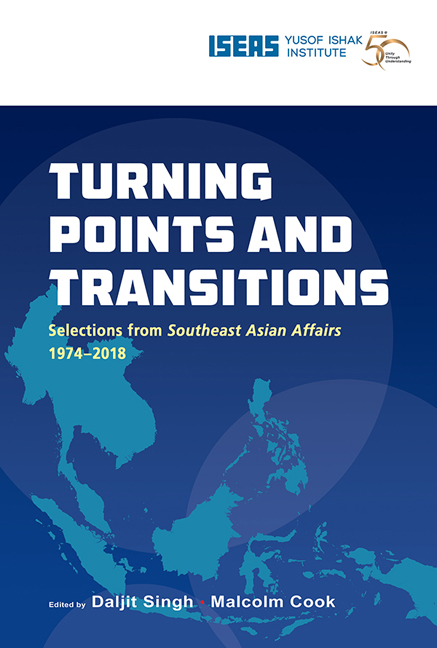Book contents
- Frontmatter
- Contents
- Message from the Director
- Foreword
- Foreword
- Introduction
- THE REGION
- BRUNEI
- CAMBODIA
- Cambodia and Regional Diplomacy (1982)
- Kampuchea 1979–81: National Rehabilitation in the Eye of an International Storm (1982)
- Cambodia 1991: Lasting Peace or Decent Interval? (1992)
- Hun Sen's Pre-emptive Coup: Causes and Consequences (1998)
- Cambodia in 2017: Plus ça change… (2018)
- INDONESIA
- LAOS
- MALAYSIA
- MYANMAR
- THE PHILIPPINES
- SINGAPORE
- THAILAND
- VIETNAM
Cambodia in 2017: Plus ça change… (2018)
from CAMBODIA
Published online by Cambridge University Press: 29 May 2019
- Frontmatter
- Contents
- Message from the Director
- Foreword
- Foreword
- Introduction
- THE REGION
- BRUNEI
- CAMBODIA
- Cambodia and Regional Diplomacy (1982)
- Kampuchea 1979–81: National Rehabilitation in the Eye of an International Storm (1982)
- Cambodia 1991: Lasting Peace or Decent Interval? (1992)
- Hun Sen's Pre-emptive Coup: Causes and Consequences (1998)
- Cambodia in 2017: Plus ça change… (2018)
- INDONESIA
- LAOS
- MALAYSIA
- MYANMAR
- THE PHILIPPINES
- SINGAPORE
- THAILAND
- VIETNAM
Summary
While election years in Cambodia are always eventful, 2017 proved to be even more so than expected. While the months leading to the June commune elections brought the customary machinations and jitters, it was the post-election developments that dashed whatever hope for political change may have been engendered by the results of the last two elections. As the ruling Cambodian People's Party (CPP) moved to consolidate its power in anticipation of the forthcoming elections in 2018, the country spiralled away from whatever measure of political openness may have been achieved in recent years. While election-related violence is not unprecedented, as forecast in the frequent references to “colour revolution” and imminent eruption of “social chaos”, the crackdown against regime opponents in the months following the June elections was wholesale and decisive. The consequences affect not only the upcoming 2018 elections but potentially the next electoral cycle as well. The hoped-for democratic transition into which the international community had poured massive financial and political investment over the last quarter of a century appears more elusive than ever.
Still smarting from its precarious win in the 2013 elections, the CPP was confronted with yet another disconcerting outcome in the 2017 commune elections. Despite the ruling party's efforts to turn the political tide, the Cambodian National Rescue Party (CNRP) successfully secured 5,007 council seats (to the CPP's 6,503) and 489 out of the 1,646 commune chief seats, a tenfold increase from their win in the 2012 elections. Though short of the 60 per cent that the party had projected, the CNRP did secure 44 per cent of the vote, compared to the CPP's 51 per cent. This narrowing margin is significant because it reveals not only a wide base of support for the opposition in urban centres but, even more significantly, an erosion of the CPP's political control in rural areas that have been the party's traditional base, where the majority of Cambodians live and where the ruling party has long-established political infrastructure. At 85 per cent of registered voters, voter turnout was impressively high, an indicator of popular optimism about the prospect of change, bolstered in no small part by the earlier performance of the opposition party, despite the preponderant power and repressive grip of the CPP.
- Type
- Chapter
- Information
- Turning Points and TransitionsSelections from Southeast Asian Affairs 1974-2018, pp. 260 - 272Publisher: ISEAS–Yusof Ishak InstitutePrint publication year: 2018

